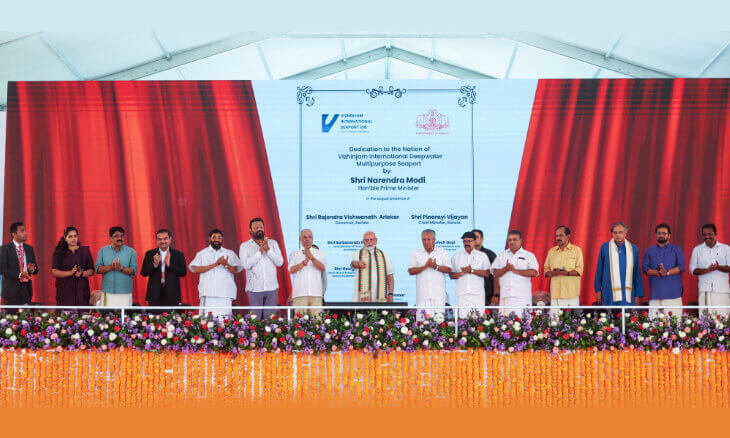
Prime Minister Narendra Modi formally dedicated the Vizhinjam International Deepwater Multipurpose Seaport to the nation. Situated in Kerala’s capital region, this Rs 8,800 crore port is the first of its kind in the country, designed specifically for container transshipment and envisioned to serve as a pivotal node in global shipping networks.
The Prime Minister marked the occasion by connecting Vizhinjam’s emergence with the broader historical and spiritual heritage of Kerala. Referencing the state’s legacy in ancient maritime trade and its cultural depth, he linked Kerala’s past significance to its future potential in the global economy.
The Vizhinjam port holds enormous strategic and economic relevance. Located near major international sea lanes and blessed with a natural depth of nearly 20 m, it is poised to handle some of the largest cargo vessels in the world. The project is expected to substantially reduce India’s dependency on foreign ports for transshipment, a move that could recapture substantial revenues and redirect economic benefits back to Indian shores.
Currently, nearly three-fourths of India’s transshipment cargo is handled at international ports. Vizhinjam’s operation aims to transform this equation, offering world-class infrastructure and efficiencies that will retain cargo movement within national boundaries, driving regional growth in Kerala and beyond.
In his address, the Prime Minister emphasized the ongoing transformation in the country’s port and logistics sector over the past decade. Turnaround times at ports have been reduced, the capacity of major ports has doubled, and India now boasts two ports ranked among the top 30 globally. Additionally, the country has expanded its national waterways eightfold, reflecting a focused push towards integrated and multimodal transport infrastructure.
Vizhinjam is also expected to catalyze job creation and industrial growth in the region. Plans are underway to develop a shipbuilding and repair cluster in Kochi, which will further support local employment and skill development. Recent policy announcements aimed at promoting large ship construction in India are also aligned with this vision, creating new opportunities for MSMEs and entrepreneurs.
Beyond infrastructure, the development of Vizhinjam fits into a broader narrative of Kerala’s resurgence. Projects like the Alappuzha and Kollam bypasses, modern railway infrastructure including Vande Bharat trains, and connectivity enhancements across highways and airports point to a coordinated effort to transform the state into a logistics and trade hub.
As India eyes a more prominent role in global trade and shipbuilding, the inauguration of Vizhinjam marks a critical milestone. Positioned as a keystone in the India-Middle East-Europe Economic Corridor, this port not only symbolizes infrastructural progress but also reaffirms India’s maritime legacy and its aspirations for the future.

